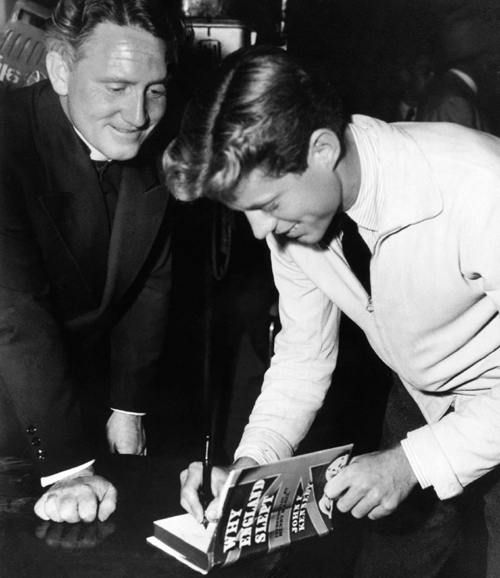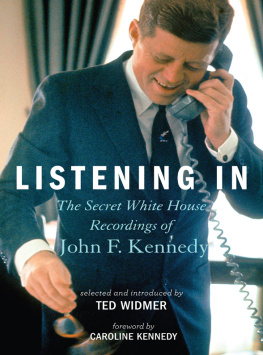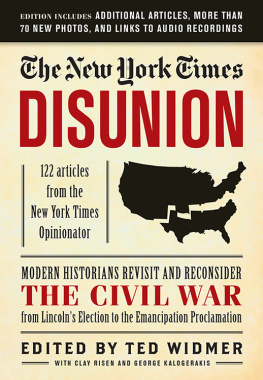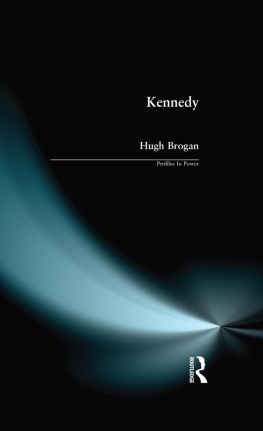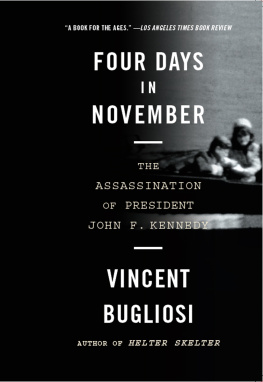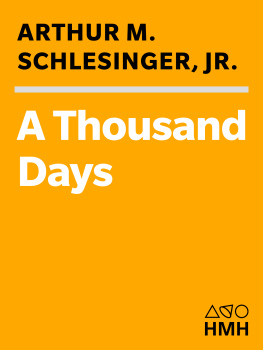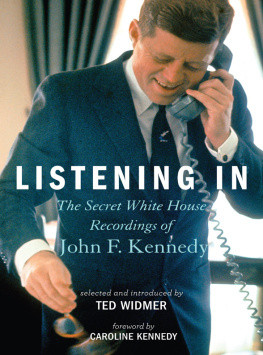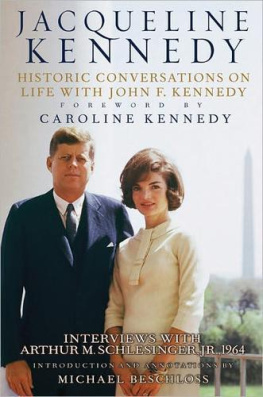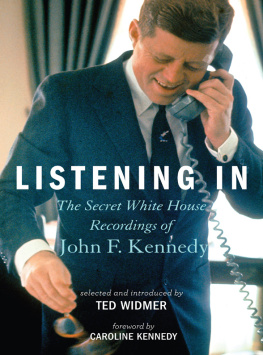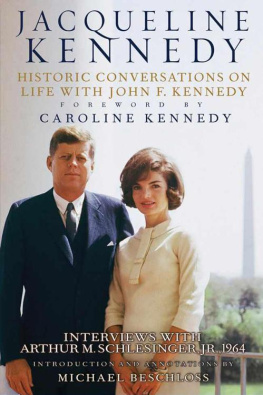Ted Widmer is director and librarian of the John Carter Brown Library at Brown University. Widmer was a speechwriter and senior adviser to President Clinton, and he conducted the oral history project that accompanied President Clintons preparation for his memoir, My Life. A former contributing editor at George, Mr. Widmer has written many works on American history and contributes frequently to The New York Times, The Washington Post, and The International Herald Tribune. He was educated at Harvard University.
Caroline Kennedy is the author and editor of nine bestselling books on American history, politics, and poetry. She is active in the efforts to improve New York Citys public schools, and serves as president of the John F. Kennedy Library Foundation.

This book would not have been possible without the help of the extraordinarily talented and devoted team at the John F. Kennedy Presidential Library and Museum, who work tirelessly to preserve history and make my fathers legacy accessible to new generations of Americans.
I am especially grateful to Tom Putnam, the Librarys outstanding director, who gave this project his full support; Chief Archivist Karen Adler Abramson, who made her exceptional staff available to assist with the research and compilation of materials; Maura Porter, who has been overseeing the declassification of the White House recordings since 2001, and whose encyclopedic knowledge of their content was invaluable; Maryrose Grossman, Laurie Austin, and Bill Bjelf of the Audiovisual Archives, who helped find, compile, and duplicate the key recordings and photographs; Audiovisual interns Hannah Weddle and Sara Ludovissy for their help with the sound recordings and scanning of images; and to Stephen Plotkin and Stacey Chandler of the Research Room, who went out of their way to find the best documents and memoranda to give historical context to the recordings.
I am also grateful to Tom McNaught, executive director of the Kennedy Library Foundation, who oversaw every aspect of this project with his customary commitment to excellence, and to Karen Mullen for her help and assistance.
I am particularly indebted to Cliff Sloan for his judgment and legal expertise, and to Rachel Day Flor and Debra Deshong Reed for their expert assistance in promoting and publicizing these historical records.
I always give thanks for Lauren Lipani, whose keen intelligence, good humor, and skillful organization is indispensable in keeping everything on track.
Listening In is the third book that the Library has done in partnership with Hyperion, and I am grateful to all those who have made these projects successfulmost of all to Gretchen Young, who has been a dedicated champion, gifted editor, and wonderful friend.
She was assisted once again by the talented team of Shubhani Sarkar, who brings an inspired sense of design to all her books, and Laura Klynstra, whose cover captures the spirit of this project. The hard production work behind the scenes was so capably done by Navorn Johnson, David Lott, Allyson Rudolph, and Linda Prather. Once again, Jill Sansone did a wonderful job on the audio, and Joan Lee, Maha Khalil, SallyAnne McCartin, and Mike Rotondo made sure this important history was available to the widest possible audience.
CAROLINE KENNEDY

Bradlee, Benjamin C. Conversations with Kennedy. New York: Norton, 1975.
Branch, Taylor. Parting the Waters: America in the King Years, 19541963. New York: Simon and Schuster, 1988.
Caro, Robert A. The Passage of Power: The Years of Lyndon Johnson. New York: Alfred A. Knopf, 2012.
Dallek, Robert. An Unfinished Life: John F. Kennedy, 19171963. Boston: Little, Brown and Co., 2003.
Dobbs, Michael. One Minute to Midnight: Kennedy, Khrushchev and Castro on the Brink of Nuclear War. New York: Alfred A. Knopf, 2008.
Freedman, Lawrence. Kennedys Wars: Berlin, Cuba, Laos and Vietnam. New York: Oxford University Press, 2000.
Fursenko, Aleksandr, and Timothy Naftali. One Hell of a Gamble: Khrushchev, Castro and Kennedy, 19581964. New York: W.W. Norton, 1997.
Kennedy, Caroline, and Michael Beschloss. Jacqueline Kennedy: Historic Conversations On Life with John F. Kennedy. New York: Hyperion, 2011.
Kennedy, Robert F. Thirteen Days: A Memoir of the Cuban Missile Crisis. New York: W.W. Norton, 1969.
Lincoln, Evelyn. My Twelve Years with John F. Kennedy. New York: D. McKay, 1965.
Mackenzie, G. Calvin, and Robert Weisbrot. The Liberal Hour: Washington and the Politics of Change in the 1960s. New York: Penguin, 2008.
May, Ernest R., and Philip D. Zelikow, eds. The Kennedy Tapes: Inside the White House During the Cuban Missile Crisis. Cambridge: Belknap Press of Harvard University Press, 1997.
Naftali, Timothy, ed. The Presidential Recordings: John F. Kennedy: The Great Crises (3 vols). New York: W.W. Norton, 2001.
Prados, John, ed. The White House Tapes: Eavesdropping on the President. New York: New Press, 2003.
Public Papers of the Presidents: John F. Kennedy (19611963). Washington: U.S. Govt. Printing Office, 19621964.
Reeves, Richard. President Kennedy: Profile of Power. New York: Simon and Schuster, 1993.
Rosenberg, Jonathan, and Zachary Karabell, eds. Kennedy, Johnson, and the Quest for Justice: The Civil Rights Tapes. New York: W.W. Norton, 2003.
Schlesinger, Arthur M., Jr. A Thousand Days: John F. Kennedy in the White House. Boston: Houghton, Mifflin and Co., 1965.
Sorensen, Ted. Counselor: A Life at the Edge of History. New York: HarperCollins, 2008.
Sorensen, Theodore C. Kennedy. New York: Harper and Row, 1965.
Stern, Sheldon M. Averting The Final Failure: John F. Kennedy and the Secret Cuban Missile Crisis Meetings. Stanford: Stanford University Press, 2003.


Kennedy published his first book, Why England Slept, in 1940, the year that he graduated from Harvard College. A study of Englands failure to increase defense spending in response to the rise of Nazism, it showed a serious grasp of international affairs, and its call on the United States to prepare for war flew in the face of many of the pronouncements of his father, former ambassador Joseph P. Kennedy. Nevertheless, Ambassador Kennedy was instrumental in supporting the books publication, and a range of influential opinion-shapers praised the new work, including the greatest of them all, Henry R. Luce, the force behind Time and Life. Exactly one radio interview survives from the media blitz, a recording made from a station in Rochester, Minnesota, featuring a very young author not long out of college.
ANNOUNCER: Good evening, ladies and gentlemen. At this time, we are indeed pleased to have with us in our studios Mr. John F. Kennedy, son of Ambassador and Mrs. Joseph P. Kennedy, who is in our city visiting Dr. and Mrs. Paul OLeary. Mr. Kennedy is the author of the recently published book, Why England Slept....
